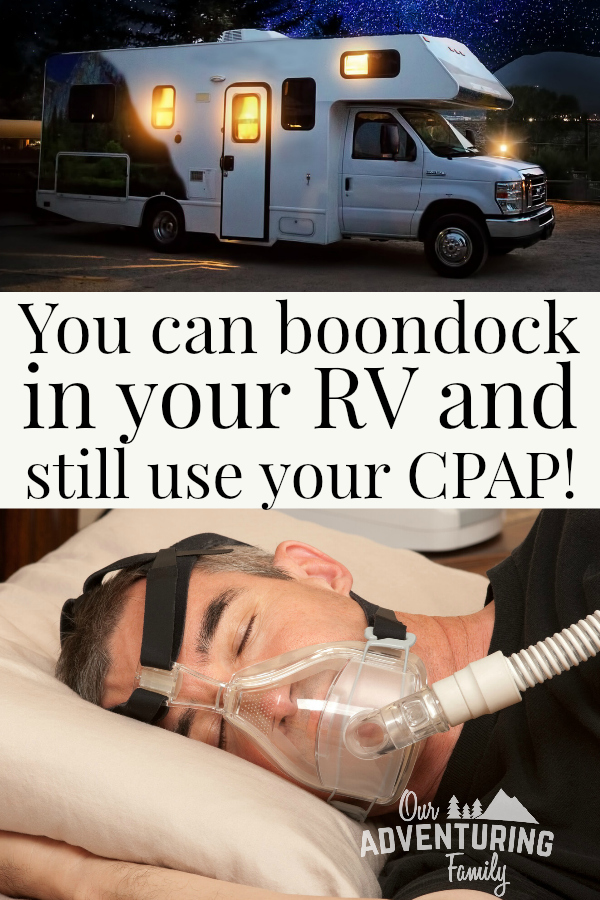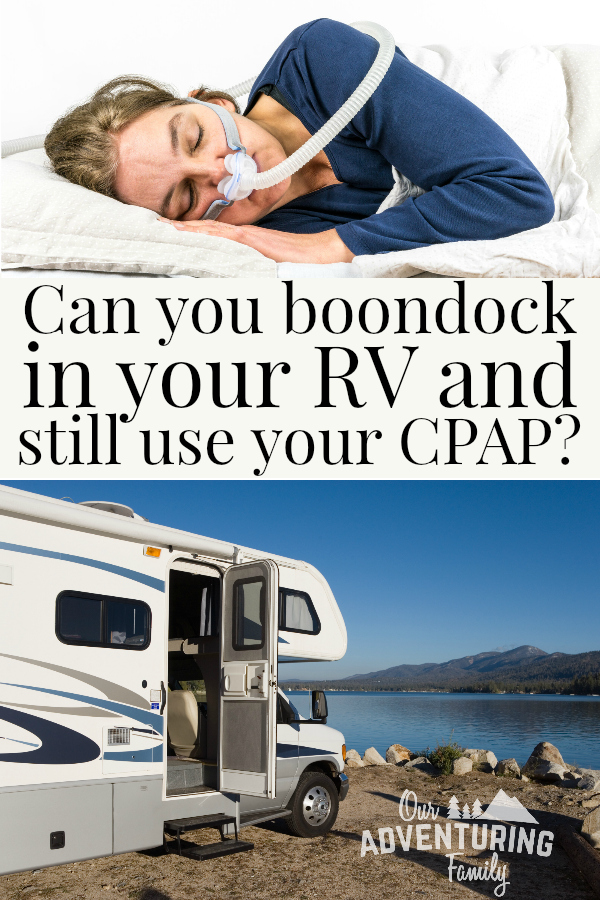This post may contain affiliate links. As an Amazon Associate I earn from qualifying purchases, but there is no additional cost for you. Please see my Disclosure page for more information.
Jeremy and I have both had sleep studies in recent months, and thankfully neither of us needs a CPAP. Until we got the results of the studies, though, we weren’t certain that would be the case. It got us thinking: how do you use a CPAP while RVing if you like to camp without electrical hookups?
We like to stay at National Park campgrounds, which usually don’t have hookups. We’ve also done some boondocking on Bureau of Land Management (BLM) land and spent many nights in truck stops and WalMart parking lots as we move from one destination to the next. So there are many times when we don’t have a reliable source of electricity other than our battery.
CPAP power options
If you’re at a campground with electric hookups, it’s not an issue. Just plug into the electric outlet at your campsite.
But if you have a machine drawing an electric current all night and your battery is the only source of electricity, what do you do? Batteries don’t always last the night even without a power drain. I’m speaking from experience here, which is why we were concerned about this issue in the first place. You could spend a lot of money upgrading your batteries or spend a more affordable amount on one of the suggestions below, which will also work if you want to go camping or backpacking.
If you don’t have an electrical source to plug into at your campsite, you have two options.
1. Power bank
Plug your CPAP into a power bank and it will keep it running all night. Power banks usually have a variety of plug connections for charging other electronics, and some also have a light for emergency lighting. Be sure you have planned how you will recharge the power bank, whether it’s a generator, solar panel, or 12v outlet in your vehicle.
2. Battery pack
Not all CPAPs will work with a power bank, so contact your CPAP manufacturer to purchase a battery pack made for your CPAP. It may be pricier than a power bank, but it will allow you to safely sleep through the night without worrying about power loss.

Two things to do before your first trip with your CPAP
Try out the power bank or battery pack before your trip. Make sure it lasts the whole night, and see if it will last the next night, or even beyond, as well. Find out before your trip what your power source’s limitations are.
Before you leave for your trip, charge your power bank or battery pack during the day using the source you plan on using. Find out how long it will take to charge during the day using a 12v outlet in your vehicle, a generator, or solar power. If you’re using solar, how will you charge it on a cloudy day? Regardless of the method, plan for a backup charging source if possible.
Some models to look at
Now, as I said, neither of us uses a CPAP, so we haven’t tried out these power banks, but they are well rated and worth looking into. Do your own research though, and make sure the one you buy will work with your specific CPAP. The ones listed below range in price from about $140 to $340 (prices fluctuate all the time). ** click on an image or the blue text to go to the listing on Amazon **
This is the smallest power supply in this list and is more a battery backup than a power bank. There are no extra outlets for charging other electronics. It doesn’t work with all CPAPs, so be sure to do your research to make sure it will work with yours. This one is also the priciest in the list.
This streamlined power bank claims to last 3-6 nights or it can be used to charge your electronic devices multiple times. It’s also on the pricey end but could be a good fit for you.
This rugged-looking power bank is priced between the more pricey power bank above, and the lower priced ones below, making it a good middle-of-the-road option.
This last power bank is the most affordably priced on this list and this one also has the most reviews. The lower price makes it more affordable to buy the companion solar panel to charge it.
Honestly, even if we didn’t need a power bank to charge a CPAP, I’d think of getting the Paxcess just to have the additional charging capabilities for our electronics. When we’re boondocking, I’d much rather use a power bank for charging than the noisy, stinky generator.
Do you have a CPAP? Do you do a lot of camping without hookups? I’d love to hear about your experiences and what has and hasn’t worked for you.
Edited to add: A week and a half after I posted this, Jeremy found out that he does need a CPAP. So we will get to try things out after all. After our trip this summer I’ll write a post about our experiences boondocking with a CPAP and what worked (or didn’t).
Edited to add this also: We’ve now boondocked with Jeremy’s CPAP and have played around with charging the power bank to see what works and what doesn’t. Click here to read about our experiences with and thoughts on the items we used.






I use an inverter in my Prius.
That’s a great idea! Thanks for sharing 🙂
Will these power banks operate a BiPap machine? And where can we get one?
I would think so. Just to make sure, you might want to call the manufacturer of your BiPap (there should be a customer service number on it somewhere) to confirm their compatibility.
If you click on one of the pictures or blue text, it will take you to a listing on Amazon for that product.
If you use a power bank to power your BiPap, I’d love to hear about your experience!
I used a Respironics System One Bi-pap for years as an over the road truck driver. Also used it in a couple campers. I purchased the 12 volt power cord and never had an issue.